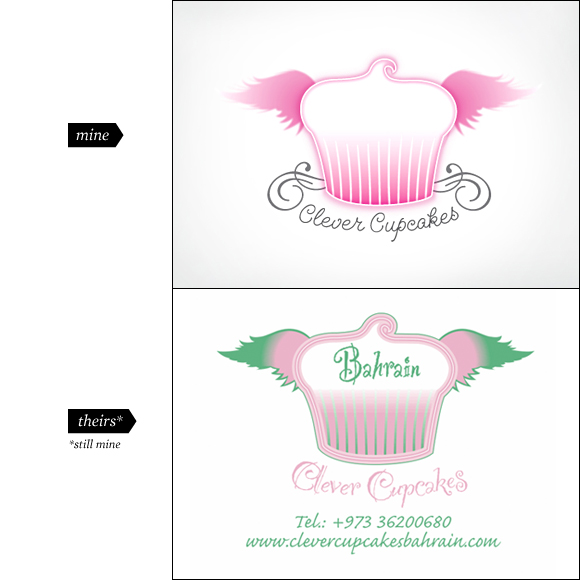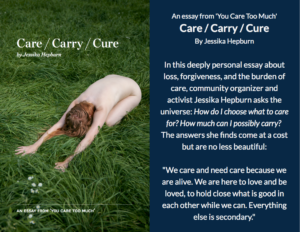The internet: where everyone goes, and where very few know how to behave. Not through lack of trying, mind you – many of us try our best, but NEW AND FUN THINGS keep popping up on our radar and we just want to THROW OURSELVES IN. Terms of use? Yes I agree, yes yes yes! Just let me into this app/game/website. Whoops, this might infringe on the rights of others – whatevs, that’s the website’s problem, amirite?
Sadly and all too oftenly, nope.
Many of us aren’t strangers to being “borrowed” from. A few years ago I designed a logo for my dear friend Michelle, then one day she emailed me with a little surprise:
Isn’t that a delightful homage? I didn’t think so, either. I emailed and respectfully asked for a take-down and the person wrote back to say that she had found my image by Googling “cupcake” and that as such it was fair game. Um, no, it’s not, really. It took a few diplomatic emails to explain why this was inaccurate. I was beginning to despair when the lightbulb moment finally arrived as I explained that had she found the McDonald’s logo instead, she wouldn’t have used it. She agreed to take the logo down.
If only it always went down this simply – often the stakes are much higher. I regularly see many talented independent artists getting ripped off by big corporations. But what if your images are not being modified or used for personal profit, yet are being shared at a dizzying rate, without your permission or even without leading back to the correct source? Surely an artist doesn’t mind getting a little free promotion, right? Well, you don’t need me to tell you what assuming does…
Pinterest has been around for a few years now, but has gathered considerably more steam and attention as of late. It’s a pretty fun concept. “Pinterest lets you organize and share all the beautiful things you find on the web.” Hey, cool. With all the nifty things I find on the web, and with all of my ideas and future plans/haircuts/meals/renovations depending on it, I could use some organizing help. There’s even some pin etiquette to help get you started. Interestingly, they’re saying to avoid self-promotion. Really? Ok then. Moving on… wait. What’s this in the Terms?
“You acknowledge and agree that you are solely responsible for all Member Content that you make available through the Site, Application and Services. Accordingly, you represent and warrant that: (i) you either are the sole and exclusive owner of all Member Content that you make available through the Site, Application and Services or you have all rights, licenses, consents and releases that are necessary to grant to Cold Brew Labs the rights in such Member Content, as contemplated under these Terms; and (ii) neither the Member Content nor your posting, uploading, publication, submission or transmittal of the Member Content or Cold Brew Labs’ use of the Member Content (or any portion thereof) on, through or by means of the Site, Application and the Services will infringe, misappropriate or violate a third party’s patent, copyright, trademark, trade secret, moral rights or other proprietary or intellectual property rights, or rights of publicity or privacy, or result in the violation of any applicable law or regulation.”
*Holds up hand* Soooo…. how can I post anything if I shouldn’t self-promote but those are the only images I actually own? How can I pin to my boards if I don’t have the rights to use the images I find on the interwebs? *Waves hand around* Is this even a sustainable business model?
It’s great that Pinterest encourages their users to credit the source (if you spend any time on Pinterest, you’ll see that a lot of images are credited to other pins, or Tumblr, or whatever other site they were copied from, instead of actually leading anywhere that would be productive to the actual creator of the image). Not to mention, Link With Love is doing an admirable job of raising awareness in this regard. And many Pinterest users are conscientious, caring people who are crediting, attributing, linking wherever they can. But there’s one thing everyone mentioned here has forgotten about:
Most, if not all, of the images you’re posting do not belong to you. You need to ask permission.
I probably should put my hand down now – my fingers are getting numb, and I don’t think anybody’s going to be able to answer my question, at least not for now. If everybody on Pinterest actually took the time to ask permission to use the images they’re pinning, would anybody still be on there? And if you really think about it, shouldn’t this already apply to all blogs, tumblrs, facebook pages, etc? I realize this is a much bigger issue that stretches far beyond the scope of this (already very long – and it keeps getting longer) post, but it’s something we should all consider on our daily internet wanderings. Professionally, when I come across a font or texture I’d like to use for a project, I read the terms of use. If they don’t grant permission for commercial use, I don’t use it. If the creator wants attribution and the project I’m working on doesn’t allow for that, I don’t use it. And so on. Why should anything else on the internet be approached any differently? If there’s a share button, or some kind of disclaimer where you agree to respect the terms, go for it. But if there isn’t – do you really need it that instantly that you can’t write a short note saying how much you like said image, and can you please use it? Not only is it respectful (and lawful), but 9 times out of 10, you’ll be making that person’s day. I don’t know about you, but I LOVE making somebody’s day…
Pinterest is trying to set up some measures to help with this. They’ve created a “pin it” button you can add to your site to allow users to pin your work, and conversely they’ve also created a code snippet you can add to your website that will block people who try to pin from it. Flickr has already implemented this code to pages with copyrighted or protected images.
Unfortunately, the code snippet is very easy to bypass and I have seen websites with no-pin codes continue to have their images pinned to Pinterest – meaning that users are still pinning even though the copyright owner of the work has specifically and unmistakably requested that they don’t. This kind of behaviour is exactly what has some content creators and bloggers so concerned, and the fact that Pinterest continues to be so passive about it (i.e. you need to contact them to file a claim of infringement, but they aren’t actively discouraging this behaviour nor investigating/enforcing this on their own).
Additionally, the pin-it button does not necessarily eliminate the permission question. Firstly, if I have obtained permission to run somebody’s work on my blog, this doesn’t necessarily mean that they have also given permission to allow their images to be pinned to Pinterest. Adding pin-it buttons throughout your blog can be misconstrued as a green light to pin when, in fact, you may not have the right to offer this kind of permission. Secondly, a trend seems to be forming where major sites are adding pin-it buttons across the board, regardless of whether the content belongs to them or not, and without giving any kind of opt-out choice. Behance has since revised their approach and are not including the pin-it button on any portfolio work that is not cc (creative commons). Etsy remains particularly worrisome because they exist primarily to showcase and promote independent artists’ work, and at the moment there is no option for sellers to remove the pin-it button from their images.
And what about all the sites that don’t have pin-it buttons? Pinterest is basically suggesting that the entire internet needs to modify their sites with the (slightly ineffective) block-out code in order to opt-out. It shouldn’t be an opt-out. It should be an opt-in.
Ok, so back to me. Since I can’t post anything I don’t own or have the rights to, how about I throw suggested pin etiquette out the window and just post my own work? Then I’m safe, right? Wrong…
“By making available any Member Content through the Site, Application or Services, you hereby grant to Cold Brew Labs a worldwide, irrevocable, perpetual, non-exclusive, transferable, royalty-free license, with the right to sublicense, to use, copy, adapt, modify, distribute, license, sell, transfer, publicly display, publicly perform, transmit, stream, broadcast, access, view, and otherwise exploit such Member Content only on, through or by means of the Site, Application or Services.”
Some of these rights sound a bit scary, but as with many other sites, they are necessary in order for the site to function as it promises to. But SELL? That’s a bad word to see in there. (“And otherwise exploit”… after everything else they’ve listed, I can’t even imagine what that would mean). If I post any of my work, I’m granting Pinterest the right to sell it? Oof. A few years ago I used to warn artist friends not to post their work on Facebook for licensing reasons but most people really don’t seem to care. And, I will admit to using Instagram (for personal use) with gleeful abandon. Perhaps Pinterest will be free of this kind of care, as well. But until the terms of use change, I think I’ll refrain from pinning my own work, or adding any pin-it buttons to my site; at least for now, thank-you.
Don’t get me wrong – the idea that somebody might like my work enough to save it as inspiration or just to share with others tickles me absolutely pink. But I have a problem with granting this kind of access to a site that will claim selling rights over my work. I wouldn’t even be able to track it or embed copyright information into it, because Pinterest strips all embedded metadata from its files. (p.s. so does Facebook, Twitter, and others).
Think you’re safe because if anybody gets really upset and starts suing, the website will take the fall? You’re not. The Pinterest terms of use state that they are free and clear of any wrongdoing. In fact, if they get sued, not only will you have to pay to defend yourself, but you’ll have to pay to defend Pinterest, too. (Facebook has similar terms, by the by).
Pinterest is a small company of 20 or so people. I understand how this can make it difficult to resolve massive issues such as this – but since they’ve already been around for a few years, and seeing as their business model appears to be built around sharing images that nobody has the rights to, I certainly hope this is something they are working on. Surely they realized this would become an issue? (Pinterest: quit calling me Shirley. Badum-bum). Recently, a petition was passed around to limit the amount of characters you could add to a pin. Turns out, people were copying entire blog posts or recipes and adding them to their pins, which eliminated the possibility of people clicking through to the actual site that was responsible for the content. Pinterest graciously implemented a character limit soon after. While I applaud this move, I feel that this was a relatively quick fix and still skirts the main issues at hand. From what I have read, they’re a conscientious team and they’re trying to do the right thing. I hope this means that significant changes for the better are in their not-too-distant plans.
If you are frustrated by the ongoing silence and lack of updates from Pinterest, and are concerned about the ethics of your Pinterest boards but lamenting the return to simple bookmarking, there may be another solution for you: Image Spark (in fact, when Pinterest showed up as the new kid on the block a while back, I thought: hey, another Image Spark). Image Spark differs from Pinterest in that it allows you to make your image collection private (this is a key difference that allows you to assemble your favourite images in one place while helping to avoid the more complex issues of sharing), has much more acceptable Terms (and in the FAQs, they specifically state that getting permission is your responsibility) and has the additional fun feature of personalized moodboards.
As for where this leaves me, I did sign up to Pinterest not long ago to see how it works… but I haven’t pinned anything, and for the time being I don’t plan to.
To sum up:
- Just because something’s on the internet doesn’t mean that it’s free for public use – it is still protected under copyright law. Some sites share their permission policies prominently but if there is any doubt, ask.
- Not everyone wants their work to be shared on Pinterest, or any other site. It doesn’t matter what their reasons are. We have all snapped a photo or similarly created something that belongs to us. Try to be respectful of others’ wishes.
- Crediting a source, while admirable, is often not enough – you should be asking permission. Drop them a line, tell them how much you love them, and ask. If they say no, move on.
- If something has a pin it button, and you know for a fact that permission has been granted, go crazy and Pinterest your pants off. If you’re unsure that a site truly has the license to share, or you come across a site that doesn’t specify whether you can pin or not – regardless of whether there is a Pinterest blockout code on it or not – ask.
Wow – you’re still here?! You super trooper, you. Thanks for sticking around. Gold star for you! And, a very special gold star thank-you to Jessika and Oh My! Handmade Goodness, for inviting me to share my thoughts with you today.
About Anile Prakash:
 A born and bred Montrealer discovering the joys of the Hudson countryside, I am a freelance graphic designer and illustrator. I am delighted by the opportunity to work directly with clients who, despite being pulled in many directions at once, still place a deservedly high value on functional and beautiful design. If you have a project you’d like to chat about together, feel free to drop me a line. I am also the design director for Pure Green Magazine, a Canadian independent print publication featuring the diversity in the green design and lifestyle market. You can subscribe here!
A born and bred Montrealer discovering the joys of the Hudson countryside, I am a freelance graphic designer and illustrator. I am delighted by the opportunity to work directly with clients who, despite being pulled in many directions at once, still place a deservedly high value on functional and beautiful design. If you have a project you’d like to chat about together, feel free to drop me a line. I am also the design director for Pure Green Magazine, a Canadian independent print publication featuring the diversity in the green design and lifestyle market. You can subscribe here!
Connect with Anile on her website Girlfriday + Twitter & Facebook
Editor’s note: I invited Anile to share her post with us (previously published here) for our ethics theme because she does such an excellent job laying out the major legal/ethical concerns with wisdom, humor and excellent research. Let’s continue this conversation in the comments below or join us tomorrow (Thursday, March 15) from 1-2EST for a Pinterest ethics #omhg chat with our lovely co-host Anile! Get all the details here.



